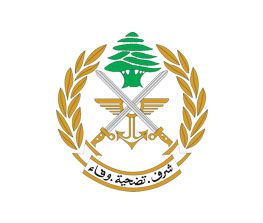The mission of the Lebanese Army

The mission of the Lebanese Army
According to the National Defense Law (Decree number 102 on 16/09/1983 and its amendments), the Army is assigned to 3 missions: Defense, security and development. These missions aim to defend the nation, preserve sovereignty and the State’s authority, protect the constitution, preserve security and stability and contribute to providing social stability and development.
The first mission of the Army is to defend the nation’s borders against any external attack. The most important works and activities performed by the Army in the frame of its defense mission are:
- Constant readiness to face the Israeli enemy and to promptly confront its attacks and aggressions with all available means.
- Preserving the stability of the regions at the southern borders and protecting them from saboteurs as well as supporting the resistance of the citizens in their villages.
- Cooperation and coordination with the UNIFIL with the aim of implementing resolution 1701 and this includes dealing with the Israeli violations and performing joint military maneuvers with the aim of raising the level of preparedness and readiness to face any emergency.
- Resuming the demarcation of the Blue Line after it was distorted due to the aggression of July 2006. The demarcation is entrusted to a specialized committee including Army personnel and another committee formed by the International Force.
- Monitoring the Lebanese regional waters, confronting Israeli violations and observing the activities of the Israeli enemy in terms of prohibiting Israeli forces from launching aggressions against Lebanese oil resources inside the Lebanese regional waters.
- Fighting terrorist organizations at the eastern and northern borders. In this regard, the Army has managed to drive away these organizations and besieged them throughout the border, thus the Army forces were able to guarantee the security of villages and towns adjacent to the border.
Based on the Lebanese Cabinet’s resolution in 1991, the Army was entrusted with the mission of keeping peace and stability at the internal scene side by side with the other security forces. Some of the most important security actions can be summed up with the following:
- Fighting terrorism and espionage crimes and addressing the threat of the Israeli enemy. The Army’s efforts in this field led to the dismantling of most of the terrorist and espionage networks and spared the country from huge material damages and losses in lives.
- Raiding arms caches and arresting the perpetrators.
- Prompt and decisive intervention aimed at controlling security incidents in different areas and providing relief services to the areas damages as a result of security incidents and achievements.
- Fighting organized crime in all its forms.
- Controlling the border on land and at sea to prohibit cross border smuggling and infiltration attempts.
- Providing a safe security ambiance to organize municipal and parliamentary elections and the different national elections.
- Following up with the efforts of clearing mines, cluster bombs and suspicious ordnances specifically those left out due to the wars waged by the Israeli enemy and the internal incidents in cooperation with a number of friend countries as well as NGOs specialized in mince clearance.
The Army has persisted since its establishment in performing this mission and played a major role in building the country’s infrastructure and alleviating the suffering of the citizens during crises and catastrophes. The most important missions of the Army in this field are:
- Building fixed and moving bridges, particularly during the repeated aggressions of the Israeli enemy against Lebanon.
- Contributing to rebuilding the infrastructure such as water, electricity and roads etc … in damaged areas as a result of the Israeli wars and the internal events.
- Building roads in remote villages.
- Contributing to extinguishing fires and launching large forestation campaigns.
- Rehabilitating archeological citadels and touristic sites as well as cleaning beaches, rivers and Oil-infested naval areas, particularly following the Israeli aggression against Lebanon in 2006.
- Managing natural disasters in coordination with the concerned agencies in the country as well as forming specialized committees to evaluate the damages of these disasters.
- Rescuing citizens trapped in snow and floods and distributing medical and food supplies as well as launching vaccination campaigns for children in remote areas.
- Distributing different types of aid in poor or damaged areas and in schools, hospitals, municipalities etc… in the frame of the Military – Civil Cooperation Program CIMIC along with other programs.
- Providing State agencies with the necessary means and expertise as well as boosting the cultural and scientific cooperation with the national universities and the committees of the civil community.














